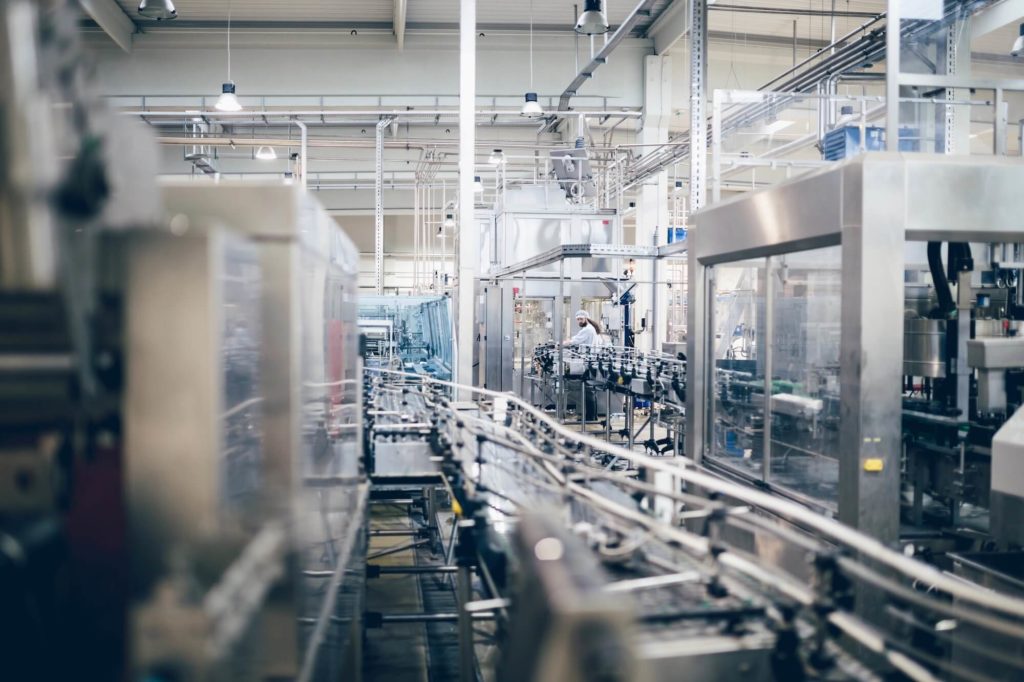Factory CCTV has become a vital tool for managing safety, productivity, and security. Factories are high-risk environments where businesses face daily challenges that demand reliable solutions. From safeguarding staff to overseeing complex operations, having the right surveillance in place makes all the difference. One of the most effective tools available to factory owners and site managers is commercial CCTV (Closed-Circuit Television). Modern CCTV systems offer more than just crime prevention; they’re integral to operational visibility, employee safety, and regulatory compliance.
In this blog, we’ll explore the top five benefits of installing CCTV systems in factories and why they’ve become a non-negotiable part of smart factory management.

1. Improving Employee Safety
Factory environments often involve heavy machinery, hazardous materials, and fast-moving production lines. Even with strict health and safety procedures in place, accidents can still happen. A CCTV system offers real-time surveillance of key areas, helping health and safety officers identify risks before they escalate.
By monitoring workspaces, stairwells, and high-risk zones, employers can quickly intervene when unsafe behaviour is spotted or when someone enters a restricted area. In the unfortunate event of an incident, CCTV footage serves as a vital tool for post-incident reviews and investigations, ensuring the right steps are taken to prevent future occurrences.
CCTV also reassures staff that their well-being is being monitored and prioritised, helping to foster a safer and more supportive workplace culture.
2. Monitoring Production Lines
Keeping production lines running smoothly is the lifeblood of any factory. Disruptions, whether from mechanical faults, staff issues, or workflow inefficiencies, can cause significant delays and financial losses. CCTV cameras positioned along production lines enable supervisors to monitor operations in real time, helping to spot faults or bottlenecks as they arise.
In many cases, production line CCTV footage can also be used as a training tool. Reviewing past footage can highlight areas for improvement, support quality control, and provide visual records for compliance audits. This makes CCTV a valuable asset not only for security but also for boosting operational efficiency.
3. Managing Access and Securing Entry Points
Controlling who enters and exits your site is fundamental to maintaining security. Factories often house expensive machinery, tools, and raw materials, making them a target for theft or unauthorised access. CCTV cameras installed at main gates, doors, and access points help monitor all movements on and off the premises.
When combined with access control systems, such as keypads, fobs, or biometric scanners, CCTV footage adds an extra layer of accountability. If a security breach occurs, recorded footage helps identify the individuals involved, what they accessed, and when.
Beyond criminal activity, CCTV also helps manage the flow of authorised personnel and contractors, providing a clear record of who was on-site and their movements, which is important for both security and health and safety compliance.
4. Reducing Theft and Vandalism
Factory sites often store high-value items, both inside and outdoors. From metal stock to finished products and components, theft can result in serious losses. Vandalism, too, can disrupt operations and damage equipment or infrastructure.
A visible CCTV system is one of the most effective deterrents to would-be thieves or vandals. Criminals are far less likely to target a facility that is clearly under surveillance, particularly if signage is in place to highlight CCTV monitoring.
Should a crime occur, CCTV recordings provide crucial evidence to support police investigations, insurance claims, and internal reviews, helping businesses recover more quickly and hold perpetrators accountable.
5. Supporting Legal and Regulatory Compliance
Factories in the UK are subject to a wide range of legal obligations, from health and safety laws to environmental and employment regulations. CCTV can help meet several of these compliance requirements by offering an accurate, time-stamped visual record of daily operations.
In the event of an HSE (Health and Safety Executive) investigation, clear footage can help demonstrate that proper procedures were followed. Similarly, if an employee raises a dispute or files a claim, CCTV can provide impartial evidence to support fair decision-making.
Factory owners must also ensure that CCTV use complies with data protection laws, such as the UK GDPR. At Active CCTV, we help clients meet these obligations by installing systems with encrypted storage, access control, and privacy-focused policies in place.
Why Choose Active CCTV for Your Factory Security?
With over two decades of experience supplying and installing commercial CCTV systems, Active CCTV understands the unique security and operational challenges faced by factories and industrial sites. We are a Hikvision Certified Partner, meaning we install the most advanced surveillance technology available, tailored to your exact site layout and risk profile.
Our systems can include:
- HD cameras with infrared night vision
- PTZ (pan-tilt-zoom) cameras for flexible coverage
- Remote monitoring via desktop and mobile
- Smart alerts triggered by movement or perimeter breaches
- Local data storage
We also offer free site assessments and no-obligation quotes, so you can get expert advice before making any decisions. Whether you’re looking to upgrade an outdated system or install CCTV from scratch, our team will guide you through every step, from planning and installation to ongoing maintenance and support.
Secure Your Factory Today
Don’t leave your site exposed to unnecessary risks. A factory CCTV system provides round-the-clock visibility, improves safety, deters crime, and supports operational excellence. To find out more about installing CCTV in your factory, contact our team today. Call us on 01492 547997 or email info@active-cctv.co.uk
We’ll arrange a free site survey and recommend a system that fits your needs, budget, and compliance obligations.
